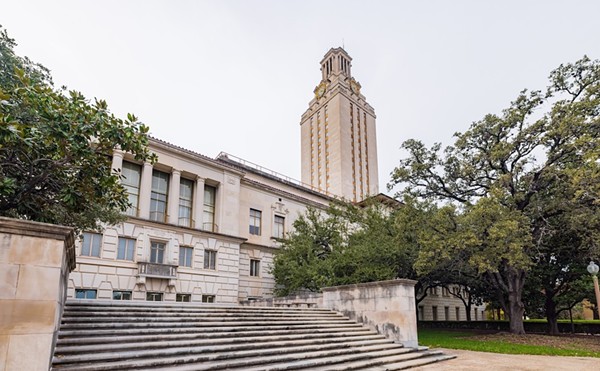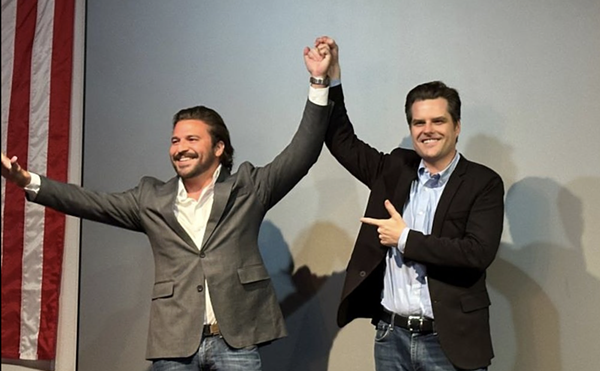John Hagee should be at home.
On October 2, the founding pastor of Cornerstone Church underwent quadruple bypass surgery, and doctors urged him to spend at least a month recuperating.
But for someone whose entire adult life has been a fire-and-brimstone crusade, a charged series of prophetic bulletins about salvation and damnation, lounging on the sofa with your feet up and a glass of lemonade at your side must feel like a form of torture.
So Hagee wobbles to the plexiglass lectern at Cornerstone on this October night, his rotund, penguin-like frame slowed only slightly by his recent medical ordeal.
“Three weeks and three nights after open-heart surgery, I’m doing well,” he announces in that unmistakable booming baritone, a sonorous instrument of authority that calls to mind Orson Welles as much as any of Hagee’s evangelical peers.
A woman in the church balcony deliriously shouts: “We love you, Pastor Hagee!”
Surely, she speaks for most of the 5,000 people who fill the spacious, off-white auditorium, not to mention the 19,000 members of the Cornerstone congregation. But this has been a tough year for Hagee. He’s gone from a popular if controversial San Antonio televangelist to a presidential-campaign piñata, the poster boy for narrow-minded intolerance. And at the age of 68, he’s confronted his own mortality with risky heart surgery. His popularity in the end-times theological wing of the Christian community is assured, but outside those walls, he’s positively radioactive.
Even in the reliably conservative world of mega-church evangelism, the old order is changing. Hagee’s incendiary political attacks and Armageddon fear-mongering suited the post-9/11 anger and anxiety that gripped America, but the rising stars on the evangelical circuit are now touchy-feely compassionate conservatives such as Joel Hunter, an Orlando, Florida, evangelical who delivered the benediction at this year’s Democratic National Convention, and Rick Warren, who heads Saddleback Community Church in California and hosted a faith summit with Barack Obama and John McCain this summer.
When Hagee returns to the helm at Cornerstone on Sunday, November 16, he will deliver his first sermon as a citizen of Barack Obama’s America, and it’s safe to say he won’t be one of the new administration’s most ardent boosters. Remember, this is a man so enamored with the Republican Party he once told TV preacher Benny Hinn: “If Al Gore was president, he would be apologizing to Saddam Hussein for existing.”
Nine months ago, Hagee endorsed Republican Senator John McCain for president over a more obvious choice, Southern evangelical Mike Huckabee. McCain had courted Hagee for months, and stood by the San Antonio pastor’s side while saying that he was “very honored” by the endorsement.
Over the next three months, McCain found himself continually having to defend Hagee’s endless backlog of inflammatory pronouncements: that the Catholic Church is the “great whore” of scripture, that New Orleans brought the devastation of Katrina on itself by sinfully planning a gay-pride parade, that all Muslims want to destroy Christianity, that God will punish the United States if our political leaders urge Israel to give up some of its land (“This nation is going to go through a bloodbath because of what you’ve done.”), and that God sent Hitler to help drive the Jews to the promised land. Finally, after the slow drip of McCain repudiating Hagee statements one by one, on May 22, he rejected the pastor’s support, leading a bitter Hagee to announce that he would never again endorse a political candidate.
Hagee has come to Cornerstone tonight because this is the 27th annual “A Night to Honor Israel” gathering, an event which defines Hagee in the Christian world. For all his wild, furious attacks on feminism, homosexuality, secular humanism, Islam, big-government liberalism, and the mainstream media, his true calling card is his obsessive concern for the future of Israel, a concern that runs so deep that he’s even willing to castigate Israelis and American Jews who show a willingness to negotiate with the Palestinians or contemplate a two-state solution in the region.
He’s here to let his followers know he’s alive and well, but also to begin the process of passing the torch to the next generation of Hagees. While both he and his son Matthew — a thin, dark-haired Xerox of his dad, right down to the last portentous inflection — emphasize that Hagee’s best days are ahead, they spend much of the night talking about a time when Matthew will take over.
Over the last few weeks, Hagee says, many have asked him, “What of our future?” He directs the audience’s attention to Matthew and says, “I want to show you our future.”
For his part, Matthew continually tells the crowd, “There can be no success without a successor,” and he assures them that he will be that successor.
At no point do the Hagees, or their invited speakers, mention the names of any political candidates. The same holds true a week later at their pre-election “God & Country” service on Sunday, November 2. Nonetheless, they do plenty of implying, suggesting, and indirectly impugning.
It starts with Matthew, who address the sea of blue-and-white Israeli flags on the floor of Cornerstone at the “Night to Honor Israel” with a blatant dig at Obama: “In a political season when the word ‘change’ has been overused as to have lost its meaning, concerning our love for Israel, nothing will change!” The audience responds with boisterous applause and shouts of approval.
They get even more stirred up when keynote speaker Michael Oren, an author and senior fellow at the Shalem center in Jerusalem, calls Jimmy Carter’s 2006 book, Palestine: Peace Not Apartheid, a “reprehensible” work, and the mere mention of Carter’s name earns a chorus of boos so hostile they would probably frighten a Philadelphia hockey fan.
During his short statement, John Hagee affirms his commitment to the “truth” of biblical law, and caustically adds: “This truth is not what you would hear at night by the liberal media, or at the United Nations.”
The U.N. comes in for much attack on this night, not with specific critiques, but with the relentless suggestion that they’re a bunch of do-nothing, one-world equivocators.
John Hagee distrusts one-world thinking and he hates equivocation. At Cornerstone’s November 2 service, guest speaker David Barton, in what is clearly meant as an affectionate, sarcastic joke, tells the congregation: “It’d be cool if Reverend Hagee had strong opinions.” Nearly everyone laughs, but Hagee sits in his chair with a blank, inscrutable expression on his face.
For Hagee, it’s always been simple: You’re with Jesus Christ or you’re against him, and there’s no middle ground (although he makes a notable exception for Jews, because he believes they have a pre-existing contract with the Almighty). When he endorsed McCain for president, he made a point of praising the candidate’s willingness to commit to a position. “John McCain is a man of principle,” Hagee told reporters. “He does not stand boldly on both sides of any issue.”
While Joel Hunter has won converts by building bridges between Christians and Muslims, Hagee argued in a 2006 NPR interview that “those who live by the Qur’an have a scriptural mandate to kill Christians and Jews.”
He’s nearly as tough on Catholicism, calling it “a Godless theology of hate,” and suggesting that Adolph Hitler was a Catholic at heart.
“He said some very intolerant things about women, people of color, Muslims, and Jews. Catholics were just one group that was targeted,” says Chris Korzen, executive director of Catholics United. “Our concern was that this was shaping up to be a narrative in the election. We were hoping for an election season that was devoid of this kind of vision, where candidates would focus on the issues and how to move our country beyond this stuff. Instead, we had this agent of intolerance, the kind of which John McCain had once openly decried in his 2000 campaign, actively campaigning with him.”
In the face of media criticism, Hagee, for one of the few times in his career, publicly apologized. He offered his “deep regret for any comments that Catholics have found hurtful,” though, in classic Hagee fashion, he directed the apology to the most politically conservative wing of the church: Catholic League President Bill Donohue, a brash media hound who branded John Kerry a bad Catholic during the 2004 presidential campaign.
One of Hagee’s most prominent local critics, Rabbi Barry Block of Temple Beth-El synagogue, describes the pastor as well-intentioned but misguided.
“I think that Pastor Hagee is a good man with whom I have very significant disagreements,” Block says. “I don’t have a real personal relationship with him, but he has very much been in our prayers for healing after his recent heart surgery, and I received a lovely, personal, handwritten condolence note from him after a tragic loss in my family this summer. So the disagreements are on principle, and not personal animus.”
Block, who has never accepted an invitation to attend the “Night to Honor Israel,” contends that the McCain debacle may have altered Hagee’s view of his role in partisan politics, if not his political beliefs. “It seems to me that Pastor Hagee learned a great deal in the process,” he says. “Pastor Hagee himself says that he’ll never again publicly endorse a candidate and that it was a mistake for him to have done so, and I concur.”
John Hagee was born to be a preacher, just like Peyton Manning was born to be an NFL quarterback, and John McCain was born to be a Navy pilot.
A fifth-generation pastor, by his own count he’s the 47th member of his family to preach the gospel (including both of his parents). Hagee likes to say that he’s been preaching for 50 years, and it’s true that he first addressed a congregation at his father’s Houston church in 1958. But Hagee’s story really takes shape in 1975, when he divorced Martha Hagee, his wife of 15 years, and, in a letter to his Trinity Church congregation, confessed that he’d been guilty of “immorality.”
By the time the divorce was final (with Martha gaining custody of their two children), Hagee had left Trinity and founded Caste Hills Assembly, the church that would eventually morph into Cornerstone. In 1976, he married Diana Castro, a 24-year-old member of his congregation.
With his reputation badly damaged by the divorce and apparent infidelity, he found solace — and a new career niche — in the Holy Land. In 1978, he and Diana (then pregnant with Matthew) made a trip to Israel, and came back committed Zionists. In 1981, when Israeli air strikes destroyed Iraq’s prized nuclear reactor, Hagee felt the need to defend Israel against the harsh criticisms of the international media.
Although he initially received little support from Jewish leaders (who looked at him “like he had a contagious rash,” according to Hagee) aside from Aryeh Scheinberg, a local Orthodox rabbi, Hagee inaugurated his “Night to Honor Israel,” meant to be a fundraiser for Jewish and pro-Israel causes, and a festive show of solidarity from Christians to the nation of Israel.
Hagee says his support for Israel stems from a heartfelt conviction that Jews have an unshakable biblical claim on Israel, but skeptics counter that his end-times theology, largely derived from the menacing imagery of the Book of Revelation, depends upon a prophesied invasion of Israel by Russia and Iran. If Israel brokered a two-state solution in the region and achieved a lasting peace with its neighbors, Hagee’s end-times checklist would be disrupted. Consider this passage from his best-known book, Jerusalem Countdown: “`God` has dragged these anti-Semitic nations to the nations of Israel to crush them so that the Jews of Israel will confess that He is the Lord. America and Europe will not save Israel — God will!”
In 2006, Hagee founded an organization called Christians United for Israel, generally described as a lobbying group. CUFI insiders, however, say the organization is merely a tool for building grassroots support for pro-Israeli causes (and opposition to a negotiated settlement with the Palestinians). They’ve developed college offshoots and raise funds through membership dues. The Cadillac of CUFI memberships is the Ambassador plan, for which you pay $25,000 annually, in exchange for a card, pin, certificate, magazine subscription, and invitations to dinners where you can be soaked for additional funds.
Hagee loves to talk about God’s fury and he seems even more obsessed with gore than the makers of True Blood, with promises/warnings of a future characterized by “every man’s sword against his brother.”
In his new book, Financial Armageddon (published on November 12 by Strang Communications), Hagee even applies doomsday preaching to our current economic crisis, arguing that the meltdown on Wall Street was “spelled out in stunning detail by prophetic writings penned more than two thousand years ago.”
Frequently overlooked by critics obsessed with Hagee’s bombastic rants, however, is the man’s folksy, self-deprecating side — his ability to take some of the sting out of the Apocalypse with aw-shucks humor.
After Matthew Hagee delivers a rousing vocal performance of “Thou O Lord Medley” and the traditional Hebrew song, “Yerushalaim Shelzahav,” a deadpan Hagee jokes: “I sing like that every morning in the shower.”
Announcing his upcoming return to full-time duty at his church, he tells his congregants, “On November 16, Gene Autry and I will be singing the same song — ‘Back in the Saddle Again.’ Maybe not at 120 miles per hour, but we’ll go at the speed limit.” At one point, he asks, “How many of you have voted? How many of you have voted twice?”
Sometimes his folksy side even intersects with his bloodlust, in strange ways. At Cornerstone’s November 2 morning service, the mega-church’s 14-piece band rampages through a medley of patriotic marches, which spurs Hagee to jokingly announce: “There’s a re-enlistment booth outside. … We have a retired marine who says, ‘I can still squeeze the trigger.’” The audience laughs. “I wish the people in Washington could do that.” It’s reminiscent of the time that Hagee wrote: “Do you know the difference between a terrorist and a woman with PMS? You can negotiate with a terrorist.”
The entire pre-election service at Cornerstone demonstrates how easily partisanship can be camouflaged. As people enter the church, a middle-aged African-American woman hands each of them an “I Vote the Bible” button. Over the course of the next two hours, two generations of Hagees and invited speaker David Barton explain what that means.
“This is the most important election since our birth as a Republic more than 200 years ago,” Hagee says. He repeatedly stresses that we are “a nation under God,” and, in an apparent jab at community organizers and big-government advocates everywhere, he argues, “We are not redeemed by our good works. We are redeemed by the blood of Christ.”
Hagee leaves most of the red-meat speechifying to Barton, a skinny, spellbinding orator in black boots and tight jeans who could easily be mistaken for a baby-boomer rock musician. Barton makes a persuasive case that Christianity (and evangelism, in particular) has been written out of American history. Again and again, he tells his listeners that elected officials don’t represent their constituents, they represent the people who actually come out to vote.
Barton backs up his case with a PowerPoint demonstration of how evangelicals turned out in big numbers in 2002 and 2004 and brought in several new anti-abortion hardliners (Texas Senator John Cornyn’s head shot is one of those featured here). He adds that evangelicals stayed away in 2006, while more than 90 percent of gays and lesbians voted, resulting in what he calls “the most aggressive pro-homosexual Congress in history.” The obvious message: Don’t let this happen again.
Two days after this church service, Barack Obama will easily win election to the presidency and the Democratic Party will expand its majorities in the U.S. House and Senate. Exit polls reveal that Obama received 78 percent of the Jewish vote.
So Hagee is out of step with the commmunity whose interests he obsessively claims to represent, but that’s no surprise. Hagee has always represented only the most conservative, intractable fraction of the Jewish community, just as he has always represented only the most conservative, intractable fraction of the Christian community.
He will surely continue to do so, but probably in a quieter way. He’s pulled back from the media since McCain rejected him (he failed to respond to repeated interview requests from the Current), and it’s likely that he will increasingly use surrogates such as CUFI, his son Matthew, and supporters such as David Barton, to bust through what he likes to call “the fog of political correctness.”
While he will inevitably lob verbal grenades at Barack Obama, Hagee isn’t quite ready to brand the president-elect a villain of biblical prophecy. Early this year, when CNN Headline News host Glenn Beck asked Hagee, in all seriousness, if Obama was the Antichrist, Hagee shot back, “No chance.”
That news should make Inauguration Day a bit less ominous for the members of Cornerstone Church. •
The Book of John
1940: John Hagee is born in Goose Creek, Texas, to pastor parents. 1958: Hagee preaches for the first time, at his father’s Houston church. 1960: Hagee marries his first wife, Martha. 1975: Hagee divorces Martha and leaves his ministry, amid hints of infidelity. He quickly begins a new ministry at Trinity Church. 1976: Hagee marries Diana Castro. 1978: Hagee and Diana make their first trip to Israel. He also launches Global Evangelism Television. 1981: Hagee hosts the first “Night to Honor Israel” 1987: Hagee dedicates new Cornerstone Church. 1996: He draws fire from African Americans for his “go home with a slave” promotion to raise money for high-school students. 2005: Hagee blames the sinfulness of New Orleans for Hurricane Katrina. 2006: Hagee helps to create Christians United for Israel.
2008: He endorses John McCain for president. McCain later rejects the endorsement.


















